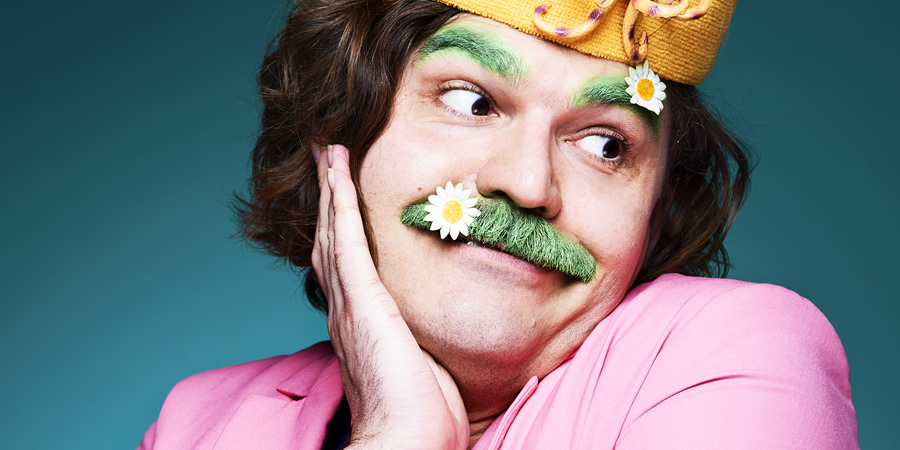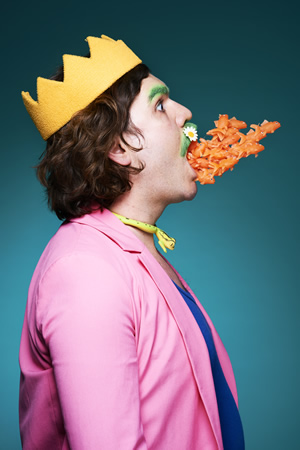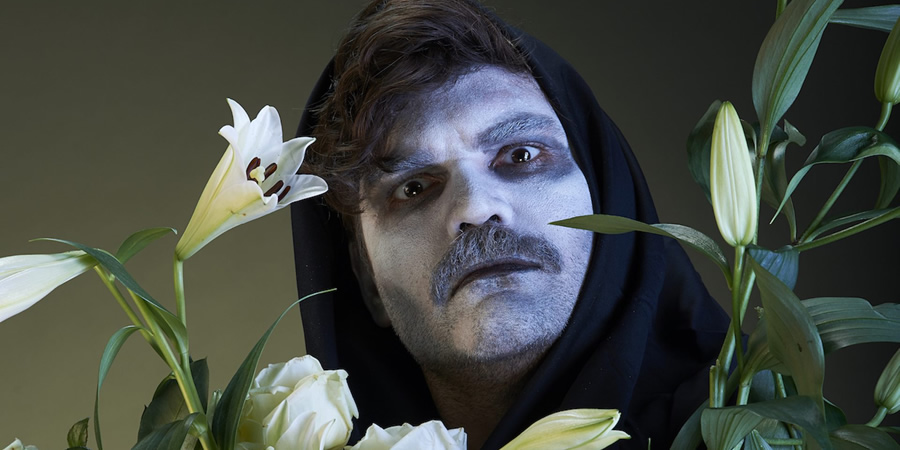
Circuit Training 129: John-Luke Roberts' Background is all Punchlines

Up above the streets and houses, overlooking one of Edinburgh's busiest venues at Fringe time, is Brooke's Club, which can be a haven of tranquillity or a den of iniquity, depending on the time of day. On this Tuesday afternoon late in the Fringe it's fairly lively - bit of dancing, bit of darts - but over in the corner, quietly contemplative about comedy, is John-Luke Roberts.
If you've ever seen a J-LR show, you'll know that onstage he's often a lot less reserved, from the enormous balloon-filled fatsuit to a practically-naked Chaucer and this year's relatively sedate model: lounge suit and green moustache with a daisy sticking out of it.
Offstage, the North-countryman has written for big TV shows (notably Have I Got News For You), and co-wrote a star-powered sitcom: Bull, with Robert Lindsay, Maureen Lipman and himself. It aired in 2015, and that same year Roberts actively refashioned his live performing, by enrolling at Philippe Gaulier's acclaimed clown college.
Back onstage, he's an influential force in absurdity being taken more seriously, as a co-founder of the Alternative Comedy Memorial Society (with Thom Tuck), and his own evolving oeuvre, the most talked-about probably being Stdad-Up, which was about his unlovely father.

That show may soon make a comeback - more below - and there are nods to it in the new one: After Me Comes the Flood (But in French) drip splosh splash drip BLUBBP BLUBBP BLUBBPBLUBBPBLUBBP!! And no, Circuit Training's cat has not just walked across the keyboard. He will though.
But does JLR challenge people too far, with these ludicrous titles and niche references? It's a particularly pertinent question as the new show heads off on tour this week, although actually you could argue that it's just regular stand-up: proper set-ups, proper punchlines. But not, necessarily, in that order.
One thing that struck me about this year's show: there's no audience interaction.
Yeah, I cut that out a little bit last year. I hate sitting in an audience and thinking 'oh god, they're going to get me up' - I always got people [involved] who I could sort of tell were willing, but I've lost interest in it at the moment. I set myself various parameters this time: 'can I do a show that just does this?' and I think you watch it in a different way. I want the audience to be able to breathe.
It's almost traditional stand-up: lots of jokes, but the punchlines are on a big backdrop behind you. I imagine you start off with a big concept like that?
I had the idea last year, of showing the audience all the punchlines. The original opening was that there'd be a huge cake on stage, a big drum roll as lights fell on the cake, then I'd walk on from the side and say 'I hate surprises'. But as I was touring, I thought, 'I want to do a show where I don't use props, or music; just me.' I remember as a kid watching Eddie Izzard, entranced almost by those VHS's.
I dropped 'show the audience the punchlines' for a while, then settled on it about three weeks before the Fringe - that was a rush to get the thing made. Then as soon as it's there you find out all the ways to use it. But I had to cut some bits during the run, for time, so there are punchlines up there that aren't in the show. In the touring version they probably will be.
How did you get started in comedy - at Cambridge?
Yes, and I did stand-up competitions; when I was 20 I got to the final of the BBC New Comedy Award, but I was far too young, I didn't know what I was doing. Because I didn't love stand-up, I loved sketch - Eddie Izzard was the exception. So I thought 'what do I do then?' I went through the clowning route. Then from there ended up doing a kind of stand-up I enjoy.
I can't imagine you young, somehow; you or Thom Tuck...
Actually Thom suited young; I think my persona was always very dry. I was doing one-liners, and I think there's something quite obnoxious about a young 20 year-old man doing that - you have to work for a certain status. It took me a while to realise 'oh I can be silly' - because you're taught in stand-up that it's all about status, but it's more about trust I think.

When was your first Fringe?
When I was 16, 2001. It was just before September 2001, a sketch show, it was as good as you probably imagine. There was a sketch in it based around an airline steward, and we put it on again a few weeks later, and realised 'oh, we can't do this sketch...'
I bet at that age you took it personally too.
We were very annoyed at the jihadists.
How does a J-LR tour work? I imagine you select the venues quite carefully?
Last year was my first proper tour really, so part of it is just going to places and then, if it doesn't work there, either deciding to go back and build an audience, or deciding 'probably not Maidenhead again.'
Or was it Maidstone? One of them. horrible. Whichever one Theresa May's constituency is [turns out it's Maidenhead - sorry Maidstone].
The weirdest thing is, they stayed during the interval, so I came back and they were all still there. And I thought 'oh does mean you like it...? I don't understand.'
Perhaps they were just quiet? I've sat with people who looked stony-faced, but actually really enjoyed themselves.
Maybe, but it's very hard, because you judge the performance on the laughter, that's what you're playing off, it's very hard to play to a smiling audience. And it's easier with bigger numbers - on tour last year I was playing to smaller numbers a lot of the time, very variable, smaller than in Edinburgh, because here I've been building this up for years.
It's harder with a smaller crowd, you can't build the right kind of rolling laughter. Five percent of ten people who find it funny is not enough to swing an audience.
But standing outside to sell merch, or on the free fringe holding a bucket, it's actually quite a good way of finding out 'oh you liked it.' A face you fixated on, looking like murder through the show, then says 'I loved that, it was really good' - and you realise, people respond in different ways.

What's the most interesting audience responses you've had? You've definitely shouted in my face before, told me how I'll die...
The dad show, I learned a lot from doing it, because I'd see people in the audience: somebody howling with laughter, someone who looked really angry, and somebody crying, all at the same time. Which was exciting, and also a bit risky to play with. I'm thinking of bringing it back, and I'm wondering, what do I actually think of that show now, how would I do it?
And also its very, very high stakes, talking about death, then doing such a taboo 'ok, and I don't like this dead person, and I'm going to perform a parody of them' - wooah. There's a lot going on, so you can easily get the tension there, and release it in big laughs, but it feels like very broad brush strokes. So is there a way of building that tension with less discomfort, do it more precisely?
From Chaucer to the Spice Girls last year, you certainly mix up the cultural references...
Oh, I just assume that everybody knows enough. I remember somebody saying: you watch Python as a nine year-old, and you get it, but you don't know necessarily who these philosophers are.
I imagine anyone would find your naked Chaucer bit funny.
It's such a stupid joke, the problem happens when people go 'oh I don't get this' and then they get angry.
There are acts who will actively do that though: 'I will challenge this audience.'
If you watch Python's 'philosophers playing football' sketch, you go 'I understand that these are philosophers, taking a high culture thing and sticking it somewhere stupid, I can laugh at that.' This new show references Nietzsche, but the routine is based on a phrase that everybody knows...
It's nice to have a niche. There aren't many people doing Nietzsche material.
No - but I don't purposefully go out of my way to make my material obscure, I just do what I find funny; I think it actually took me quite a while to realise 'oh wait, this isn't mainstream!'
Now there's a middle ground - if I decided 'ok, I'm just going to do stuff the audience wants me to do,' I might as well have trained to be a lawyer, and earned loads of money doing something I didn't enjoy. Which wasn't this.

Were you disappointed not to be nominated for the Edinburgh Comedy Award in 2018? Everyone thought you would be...
Ha... what I would say, had the list been full of theatrical, innovative, weird comedy shows, it would have been a harder thing to take, I think, but as it was mainly good quality stand-up, then it's not like I've been left off that list, because that's what they want.
They did seem to have a type last year.
I've got to the stage where I don't invest much in it. Thousands of shows, how can you possibly get the best five, or six?
It's a shame that the attention at this festival [the Fringe] is largely to do with that competition. I think other festivals, it feels much easier to get into what you're actively doing, creating art, enjoying your peers' success. Here, you have to fight not to get into the ego feeling of it. And that's a real shame.
You could argue that the prize has raised the quality, but in a particular way; making shows for the press, rather than making a show that's the best it can be.
I've seen lots of similar gags and themes reoccur at this Fringe, which will always happen - but I can't think of anything in your show I've seen elsewhere.
I do write jokes and then worry, 'God did I hear that somewhere?' But there's not much you can do about that. And the vast majority of my stuff, it wouldn't be possible for someone else to have come up with it, because it's pushed in such a weird direction.
You've done a fair bit of TV writing - I'd be interested to see you in a writers' room.
I haven't been in many. They exist here a bit more now, but there's not really the money for them, so our sitcoms are six episodes long and written by one or two people. Writing a joke, it's nice, it's like doing [musical] scales in a way, exercising those muscles - 'ok, how does a joke work?'
It seems odd hearing you talk about crafting jokes like that, but then the new show is full of them. So is it still absurdism?
Oh, it's still absurd, I'd like you to find a bit which isn't. I'd say it quite a delicate, stupid piece, about surprises. It's kind of a celebration of the imagination, how far an audience can go, building a world in their heads.
Help us publish more great content by becoming a BCG Supporter. You'll be backing our mission to champion, celebrate and promote British comedy in all its forms: past, present and future.
We understand times are tough, but if you believe in the power of laughter we'd be honoured to have you join us. Advertising doesn't cover our costs, so every single donation matters and is put to good use. Thank you.
Love comedy? Find out more